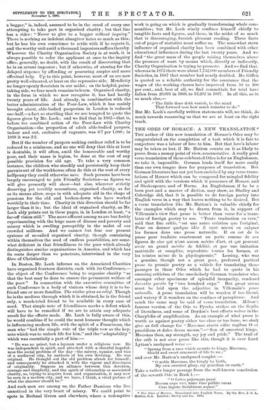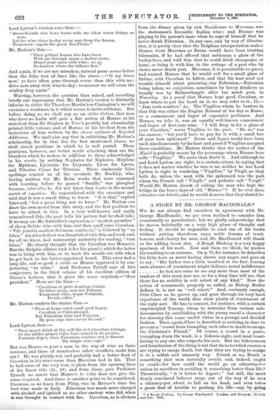THE ODES OF HORACE : A NEW TRANSLATION.* THE author
of this new translation of Horace's Odes may be congratulated on the completion of a task which it is fair to conjecture was a labour of love to him. But that love's labour may be taken as lost, if Mr. Hatton counts on it as likely to prove, from a money point of view, remunerative. A really good verse translation of these celebrated Odes is for an Englishman,
we take it, impossible. German lends itself far more easily than our own tongue does for purposes of translation. But German literature has not yet been enriched by any verse trans- lations of Horace which can be compared for mingled fidelity and spirit with the versions which it possesses of Homer, and of Shakespeare, and of Burns. An Englishman, if he be a born poet and a master of diction, may show, as Shelley and Coleridge did, that it is possible to do foreign poetry into English verse in a way that leaves nothing to be desired. But a verse translation like Mr. Hatton's is valuable chiefly for the examples which may be drawn from it, in support of Villemain's view that prose is better than verse for a trans- lator of foreign poetry to use. " Toute traduction en vers," said that fine critic, "eat une autre creation que l'original. Pour en donner quelque idee it rant mieux en calquer les formes dana une prose naturelle. Il en est de la, prose pour traduire exactement un poste comme de ces figures de cire qui n'ont aucun merite d'art, et qui peuvent avoir un grand merite de fidelity, et par une imitation materielle et complete, reproduire toutes les formes, et lea teintes mane de la physiognomie." Leasing, who was a genuine, though not a great poet, preferred poetical prose to prosaic poetry as a vehicle for translating those passages in these Odes which he had to quote in his amusing criticism of the unscholarly German translator who, amongst other specimens of splendid incapacity, rendered ducentia pocula by " two hundred cups." But great stress must be laid upon the adjective in Villemain's prose naturelle. A prose translation will be wooden if too literal, and watery if it wanders on the confines of paraphrase. And much the same may be said of verse translation. Milton's famous version of the Ode to Pyrrha strikes on the Scylla of literalness, and some of Dryden's best efforts welter in the Charybdis of amplification. As an example of what prose is worth as against poetry either too close or too loose, we shall give as full change for " Maecenas atavis edite regibus 0 et praesidium et dulce decus meum,"—" Son of ancestral kings, Maecenas thou, my strength, my joy and pride." The trail of the crib is not over prose like this, though it is over Lord Lytton's unrhymed verse :- " Sprung from a race which mounts to kings, Maecenas, Shield and sweet ornament of life to me;" and over Mr. Hatton's unrhymed couplet :— " 0 noble MEecenas, the kingly by birth, My own sweetest glory, my guardian on earth."
Take a rather longer passage from the well-known conclusion of the seventh Ode in Book i. :— " 0 fortes pejoraque passi
Mecum sEepe viii,mane vino pellite cures eras ingens iterabimus fequor."
• The Odee of Horace. Translated into English Verse. By the Rov. J. S. L. Hatton, B.A. Loudon : Seeley and Co. 1890.
Lord Lytton's version runs thus :- "Brave friends who have borne with me often worse things as men, Let the wino chase to-day every care from the bosom, To-morrow--again the great Sea-Plains."
Mr. Hatton's thus :- "Then gallant heroes who have been With me through many a darker scene, Dispel your cares with wine; we go To-morrow where the billows flow."
And again, if we are not mistaken, natural prose seems better than the false trot of lines like the above :—" 0 my brave men ! ye have often gone through worse than this with me ; drive care away with wine to-day ; to-morrow we will cross the mighty deep again."
Waiving, however, the question thus raised, and recording briefly our impression that Mr. Hatton's version is distinctly inferior to either Sir Theodore Martin's or Conington's, we will examine a weakness in it which seems to invite criticism. But before doing so, we shall say, as an obiter dictum, that men who have no Latin will gain a fair notion of Horace at his stateliest from Sir Stephen de Vere's prettily but abominably printed little volume, and of Horace at his liveliest from the imitations of him written by the clever authors of Rejected Addresses. We shall also say that in criticising Mr. Hatton's scholarship, for in that lies the flaw mentioned above, we shall attack positions in which he is well posted. These positions, however, are better worth attacking than are the blunders which he makes, in addition to those acknowledged in his errata, by writing Nephates for Niphates, Mitylene
for Mytilene, Lycimnia for Licymnia, Licus for Lycus, and Tiberias Cwsar for Tiberius. These ominously false spellings remind us of the eccentric Mr. Buckley, who, having written for Mr. Bohn works that were crammed with learning before he passed " Smalls," was ploughed because, inter alia, he did not know that gTagoy is the second aorist of xa,Lc(34ye4. He expostulated with the examiner, and said that it was a small thing to know. " It is that," replied Linwood, " but a great thing not to know." Mr. Hatton can draw his own moral from this story, and the first position we have to attack is this. In a very well-known and easily remembered Ode, the poet tells his patron that he shall take,
if we may use Mr. S wiveller's expression, a " modest quencher " of cheap Sabine wine with him, and then quaff some Cwcuban.
" Vile potabis modicis Sabinum cantharis," is followed by " to bibes." An old scholiast was dissatisfied with this, and read, and, for all we know, had manuscript authority for reading, " tum bibes." He clearly thought that the Cwcuban was Horace's. But the Delphic editors took it for his guest's, which the latter was to bring with him, or to wash his mouth out with when he got back to his better-appointed board. This error had a long life, and so good a critic as Munro approved it by con- jecturing " tu vides." And Professor Tyrrell says of this conjecture, in the third volume of his excellent edition of Cicero's Letters, that it gives the sense required,—" thou providest." Here are the lines :—
" Csecubum et prelo domitam Caleno Tn bibes uvam, mea nee Falernre
Temperant vites, neque Formiani, Pocula colles."
Mr. Hatton renders the stanza thus :—
" Thou at home cant quaff good liquor, Cncuban or Cales-pressed,
But Falernian wine and Formian My poor cups have never blessed."
Lord Lytton thus :—
"Thou mayst drink at thy will the rich Crecuban vintage, Or the milder grapes Cales have tamed in its presses, Formian slopes, vines Falernian combine not to flavour
My simple wine-cups."
But was Horace so poor a man in the way of wine as these versions, and those of numberless other versifiers, make him out ? He was plainly not, and probably had a better flask of Cwcuban in his store-room than Maecenas had in his. That he had some of the very best, is plain from the opening lines
of his finest Ode 29), and from these, pace Professor Tyrrell, we assert that Munro's to vides does not give the sense required. And there is another point to be considered.
Csecuban, as we learn from Pliny, was in Horace's time the best wine made in Italy. Falernian was much more charged with alcohol, and ignited as no other ancient wine did, when it was brought in contact with fire. Ctecuban, as is obvious
from the dinner given by rich Nasidienus to Maecenas, was the statesman's favourite Italian wine ; and Horace was playing to his patron's taste when he says of himself that he never drank Falernian. In any case, and by way of illustra- tion, it is pretty clear that the Delphian interpretation makes Horace treat Maecenas as Burns would have been treating Glencairn, if he had offered that nobleman a glass of the barley-bree, and told him that he could drink champagne at home, or bring it with him to the cottage of a poet who by choice never drank port. Maecenas, it is permissible to guess, had warned Horace that he would call for a small glass of Sabine, with Caicuban to follow, and that his host need not trouble himself about procuring any Falernian,—Falernian being taken, we conjecture, sometimes by heavy drinkers as brandy was by Balmawhapple after too much port, in Waverley. As a proof that Horace kept good Ca3euban, or knew where to put his hand on it, we may refer to iv., 12,—. "Jam veris comites," &c. The Virgilius whom he banters in that Ode was either the Eugene Rimmel of his day at Rome, or a connoisseur and buyer of expensive perfumes. And Horace, we take it, was an equally well-known connoisseur and buyer of first-rate wine. " I will drop in for a glass of your Ctecnban," wrote Virgilius to the poet. "Do so," was the answer; " but you'll have to pay for it with a small box of your best spikenard." Scent and liquor would have been used simultaneously by the host and guest if Virgilius accepted these conditions. Mr. Hatton thinks that the author of the Jneid is probably meant by the personage whom Horace here calls " Virgilius." We more than doubt it. And although he and Lord Lytton are right, to a certain extent, in saying that it does not matter whether he was or no, neither he nor Lord Lytton is right in rendering " Virgilius " by Virgil, as they both do, unless the man with the spikenard was the poet whom the French call " Virgile," and pedants call " Vergil." Would Mr. Hatton dream of calling the man who kept the bridge in the brave days of old, " Horace"? If he ever does, solventur rise tabula, and he would deserve that they should be.



















































 Previous page
Previous page